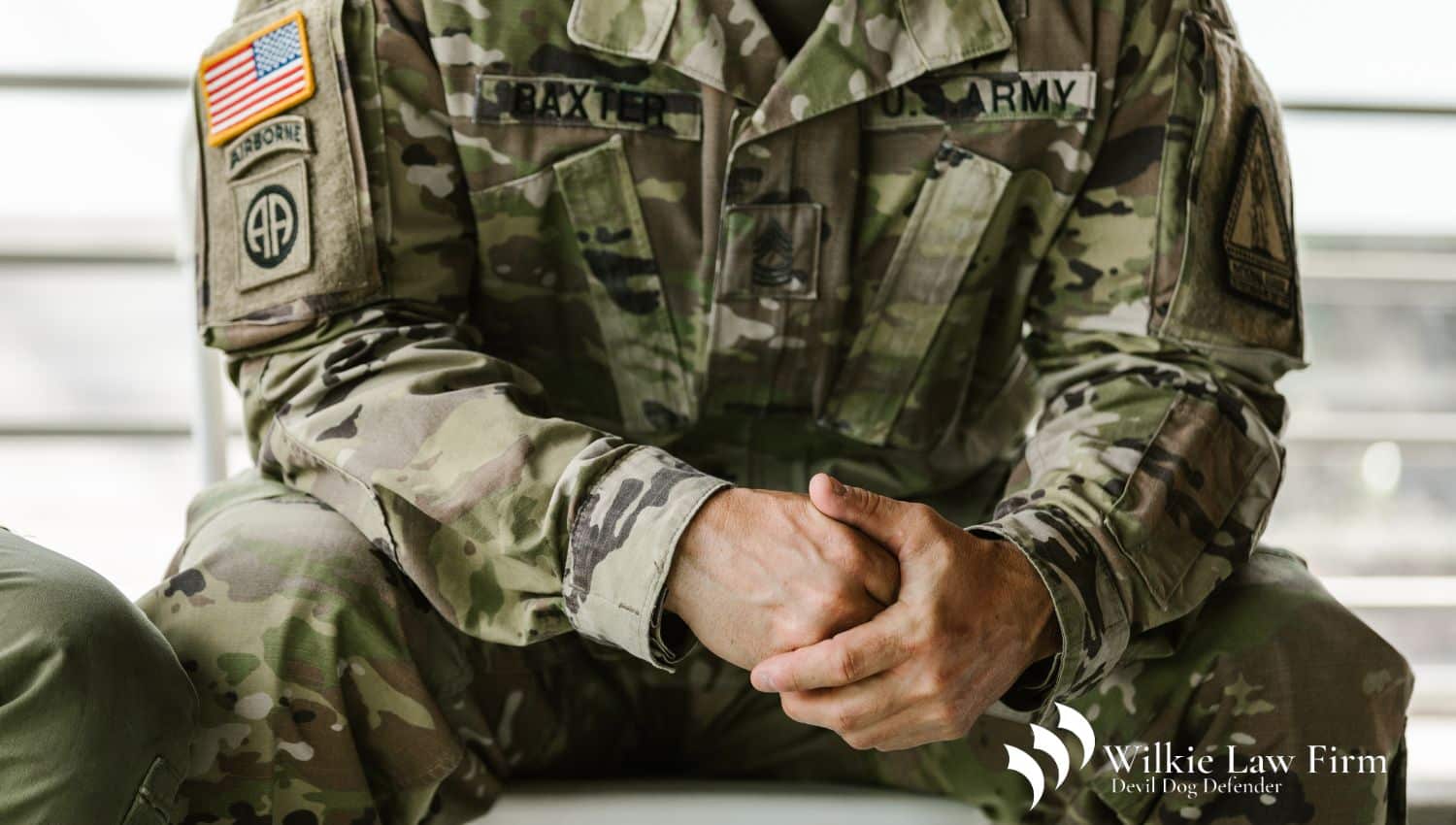UCMJ Articles
Military Defense Attorney for UCMJ Article Violations
Home » UCMJ Articles
Military Counsel
UCMJ Articles
Articles of the Uniform Code of Military Justice
Table of Contents
At all places and at all times, Members of the armed forces are governed by a code of laws known as the Uniformed Code of Military Justice (UCMJ). The Articles are contained within a book called the Manual for Courts-Martial (MCM).
Along with the UCMJ and also in the MCM are the Rules for Courts-Martial (RCM), Rules of Evidence (MRE), and a number of other items for relevant reference. Members of the military, like their civilian counterparts, still enjoy the protections afforded under the U.S. Constitution and Supreme Court precedent. However, a member of the military is also subject to the UCMJ and has to contend with the code of laws represented there.
The enumerated crimes (a certain section of the UCMJ) contained within the MCM are known as the Punitive Articles. These Articles are numbered in a fairly arbitrary way, but each number corresponds to a separate offense.
The process of legal administration in the U.S. Military begins and often ends with the respective Military Commander. The process itself is known as Military Justice. Unlike in the civilian world, where a State or Federal Prosecutor decides who to prosecute under the respective laws, in the military, this power is held solely by the Commander.
The Commander has many tools in his proverbial disciplinary kit to deal with the issue of good order and discipline within his Chain of Command (COC). But, for the purposes of this discussion, we will be focusing on the UCMJ, which is the tool to be used in the case of any type of Courts-Martial (military court).

Experienced UCMJ Lawyer for Service Members
Needless to say, the stakes are high for a military member whose been accused of a criminal offense. Their entire career and everything they’ve worked for hangs in the balance, and it’s important that they find someone who understands the gravity of such a situation and who can wholeheartedly advocate for them. Aside from the loss of income that could come with being discharged from the military, you stand to lose all sorts of benefits (e.g., VA loan eligibility, the G.I. Bill, etc.). That being the case, you need someone on your side with the experience and the tenacity required to fight for your freedom and reputation. That person is the Devil Dog Defender, Aden Wilkie.
After serving 20-plus years in the United States Marine Corps, Mr. Wilkie knows exactly what his clients are up against. He can bring experience, skill, and an unwavering commitment to protecting you in a way that a JAG attorney wearing the same uniform as the prosecutors cannot. If you are a service member in need of aggressive civilian criminal defense, reach out to the The Wilkie Law Group for a consultation today.
What is the UCMJ?
The Uniform Code of Military Justice is federal law enacted by Congress which defines the United States military criminal justice system. The jurisdictional reach of the UCMJ is worldwide and always applies to active-duty service members and military personnel in all locations. The President, as Commander in Chief, writes the implementing rules such as the Rules for Court-Martial (RCM) and the Military Rules of Evidence (MRE) rules and regulations for the Code. The UCMJ, on the other hand, arises from the Legislative branch and is statutory law enacted by Congress.
To enact new rules and regulations, the President issues an executive order, known as the Manual for Courts-Martial (MCM). The MCM is the rule book by which the military justice system game is played. The information contained within the MCM explains rules and regulations for everything from the conduct of a court-martial, to conducting an Article 15 or Non-Judicial Punishment and a number of other additions like a copy of the U.S. Constitution and discussion or commentary sections relating to the RCM, MRE, and Punitive Articles.
Types of Courts-Martial
Each article of the UCMJ details a specific criminal offense, and when a service member is in violation of an article of the UCMJ, they could face serious punishment. Depending on the type of Court-Martial and nature of the charge, they could face days, months, years, or even life in prison. Additionally, some offenses could result in a Bad Conduct Discharge (BCD) or a Dishonorable Discharge (DD).
A Special Court-Martial (SPCM) is roughly equivalent to a misdemeanor trial in the civilian world. This means that a conviction at a SPCM (though less in severity) is nonetheless a federal misdemeanor conviction. Meanwhile, a General Court-Martial (GCM) is a federal felony trial, and as such, any conviction at a GCM results in a federal felony conviction.
How Often Does the MCM Change?
Though a new MCM is only published every four years (the most recent being in 2019), the contents may change yearly through additions and changes through Executive Orders in the case of the MRE and RCM. In the case of changes to the UCMJ or punitive articles, updates can be found in the latest version of the National Defense Authorization Act (NDAA).
Some years bring big changes to certain articles of the UCMJ/punitive articles, while other years less change occurs. Depending on the date of the criminal conduct will determine which version of a crime/article applies to your case. That is why you need an experienced defense attorney who is aware of these sometimes-nuanced changes. A good military defense lawyer like Aden Wilkie will know how that will impact your case procedurally and provide avenues of defense depending on the facts alleged.
How Many Articles Are in the UCMJ?
There are currently 146 UCMJ articles, along with 12 sub-articles, meaning the entire code encompasses 158 articles.
Punitive Articles of the UCMJ
Within the UCMJ, Article 77 through Article 134 are considered the punitive articles. We’ll provide each article number with its respective offense below:
General Offenses
- UCMJ Article 31 – Self-Incrimination
- UCMJ Article 77 – Principals
- UCMJ Article 78 – Accessory after the fact
- UCMJ Article 79 – Conviction of offense charged, lesser included offenses, and attempts
Inchoate Offenses
- UCMJ Article 80 – Attempts
- UCMJ Article 81– Conspiracy
- UCMJ Article 82 – Soliciting commission of offenses
Place of Duty Offenses
- UCMJ Article 83 – Malingering; fraudulent enlistment, appointment, or separation
- UCMJ Article 84 – Breach of medical quarantine
- UCMJ Article 85 – Desertion
- UCMJ Article 86 – Absence without leave
- UCMJ Article 87 – Missing movement; jumping from vessel
- UCMJ Article 87a – Resistance, flight, breach of arrest, escape
- UCMJ Article 87b – Offenses against correctional custody and restriction
Authority Offenses
- UCMJ Article 88 – Contempt toward officials
- UCMJ Article 89 – Disrespect toward superior commissioned officer; assault of superior commissioned officer
- UCMJ Article 90 – Willfully disobeying super commissioned officer
- UCMJ Article 91 – Insubordinate conduct towards warrant officer, noncommissioned officer, or petty officer
- UCMJ Article 92 – Failure to obey an order or regulation
- UCMJ Article 93 – Cruelty and maltreatment
- Article 93a – Prohibited activities with military recruit or trainee by person in position of special trust
- UCMJ Article 94 – Mutiny and sedition
Enemy/Post Offenses
- UCMJ Article 95 – Offenses by sentinel or lookout
- UCMJ Article 95a – Disrespect towards a sentinel or lookout
- UCMJ Article 96 – Release of prisoner without authority; drinking with prisoner
- UCMJ Article 97 – Unlawful detention
- UCMJ Article 98 – Misconduct as prisoner
- UCMJ Article 99 – Misbehavior before the enemy
- UCMJ Article 100 – Subordinate compelling surrender
- UCMJ Article 101 – Improper use of countersign
- UCMJ Article 102 – Forcing a safeguard
- UCMJ Article 103 – Spies
- UCMJ Article 103a – Espionage
- UCMJ Article 103b – Aiding the enemy
Falsity Offenses
- UCMJ Article 104 – Public records offenses
- UCMJ Article 104a – Fraudulent enlistment, appointment, or separation
- UCMJ Article 104b – Unlawful enlistment, appointment, or separation
- UCMJ Article 105 – Forgery
- UCMJ Article 105a – False or unauthorized pass offenses
- UCMJ Article 106 – Impersonation of officer, noncommissioned officer, agent, or official
- UCMJ Article 106a – Wearing unauthorized insignia, badge, ribbon, device
- UCMJ Article 107 – False official statements; false swearing
- UCMJ Article 107a – Parole violation
Property Offenses
- UCMJ Article 108 – United States military property – Loss, damage, destruction, or wrongful disposition
- UCMJ Article 108a – Captured or abandoned property
- UCMJ Article 109 – Property other than United States military property – Waste, spoilage, or destruction
- UCMJ Article 109a – Mail matter: wrongful taking, opening, etc.
Vessel / Vessel Offenses
- UCMJ Article 110 – Improper hazarding of vessel or aircraft
- UCMJ Article 111 – Leaving scene of vehicle accident
Intoxication / Drug Offenses
- UCMJ Article 112 – Drunkenness, disorderly conduct, and other incapacitation offenses
- UCMJ Article 112a – Wrongful use, simple possession, etc., of controlled substances
- UCMJ Article 113 – Drunken and reckless operation of a vehicle, aircraft, or vessel
Endangerment / Threatening Offenses
- UCMJ Article 114 – Endangerment offenses
- UCMJ Article 115 – Communicating threats
- UCMJ Article 116 – Riot or breach of peace
- UCMJ Article 117 – Provoking speeches or gestures
Murder / Manslaughter / Child Endangerment
- UCMJ Article 118 – Murder
- UCMJ Article 119 – Manslaughter
- UCMJ Article 119a – Death or injury of an unborn child
- UCMJ Article 119b – Child endangerment
Sexual Offenses
- UCMJ Article 120 – Rape and sexual assault generally
- UCMJ Article 120a – Mail: deposit of obscene matter
- UCMJ Article 120b – Rape and sexual assault of a child
- UCMJ Article 120c – Other sexual misconduct
Larceny / Fraud Offenses
- UCMJ Article 121 – Larceny and wrongful appropriation
- UCMJ Article 121a – Fraudulent use of credit cards, debit cards, and other access devices
- UCMJ Article 121b – False pretenses to obtain services
- UCMJ Article 122 – Thefts of personal property; robbery
- UCMJ Article 122a – Receiving stolen property
- UCMJ Article 123 – Offenses concerning government computers
- UCMJ Article 123a – Making, drawing, or uttering check, draft, or order without sufficient funds
- UCMJ Article 124 – Frauds against the United States
- UCMJ Article 124a – Bribery
- UCMJ Article 124b – Graft
Offenses Against Persons
- UCMJ Article 125 – Kidnapping
- UCMJ Article 126 – Arson; burning property with intent to defraud
- UCMJ Article 127 – Extortion
- UCMJ Article 128 – Assault
- UCMJ Article 128a – Maiming
- UCMJ Article 128b – Domestic violence
- UCMJ Article 129 – Burglary; unlawful entry
- UCMJ Article 130 – Stalking
Obstruction Offenses
- UCMJ Article 131 – Perjury
- UCMJ Article 131a – Subornation of perjury (influencing or persuading another to commit perjury)
- UCMJ Article 131b – Obstructing justice
- UCMJ Article 131c – Misprision of a serious offense
- UCMJ Article 131d – Wrongful refusal to testify
- UCMJ Article 131e – Prevention of authorized seizure of property
- UCMJ Article 131f – Noncompliance with procedural rules
- UCMJ Article 131g – Wrongful interference with adverse administrative proceeding
- UCMJ Article 132 – Retaliation
Offenses of General Application
- UCMJ Article 133 – Conduct unbecoming of an officer and gentlemen (military officer misconduct)
- UCMJ Article 134 – General article
- Clause 1 Offenses: Disorders and neglects to the prejudice of good order and discipline in the armed forces.
- Clause 2 Offenses: Conduct of a nature to bring discredit upon the armed forces.
- Clause 3 Offenses: Noncapital crimes or offenses which violate federal law including law made applicable through the Federal Assimilative Crimes Act.
Article 134 grants the armed forces the ability to punish military members for crimes not explicitly stated in the previous punitive UCMJ articles, so long as it is not a capital offense. It includes crimes such as animal abuse, child pornography, fraternization, petty officer gambling, negligent homicide, adultery, dishonorably failing to pay debts, and more.
Civilian Defense Attorney for UCMJ Article Violations
Military law is a complex and very nuanced system, and a service member who is found guilty of committing military crimes has a lot to lose. A private civilian defense lawyer like Aden Wilkie of The Wilkie Law Group offers military members their best chance at avoiding maximum punishment and keeping their career on track. Located in Jacksonville, NC, Mr. Wilkie proudly services the armed forces at Camp Lejeune and Fort Bragg as well as other bases, camps, stations, and posts across the nation.





